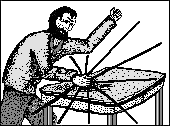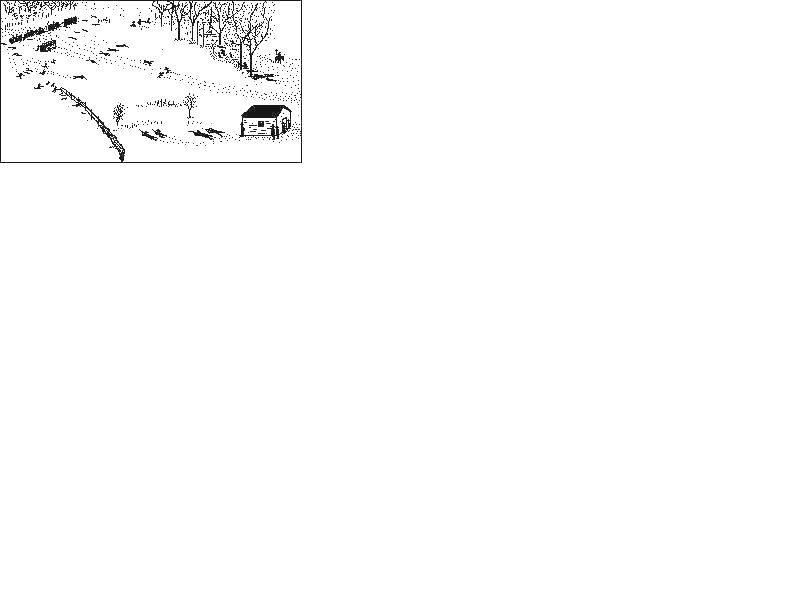








Finding a Leader:
Years later in 1884, a railway was being built across the country. The Metis in the Batoche area expected that the new railway would bring a flood of White settlers. They again feared that the way of life in their locality would become the way of life of the English-speaking White man.
At this time, most people in the North-West were unhappy with the Canadian government. A group of French and English Metis and some White settlers held a meeting near Batoche. They all agreed that they needed a leader who could get results.
Gabriel Dumont was at the meeting. He was still a strong leader at 47 years of age, but he could not read or write, so he had not been very successful at getting the Canadian government to respond to complaints. Now Dumont believed that someone else would be more effective as their leader.
They needed a leader who was truly outstanding. They needed someone who could read and write, speak both French and English, who could get the Canadian government to respond to their demands, and who was liked by all the peoples in the North-West. They needed a very, very talented leader. Naturally, they chose a school teacher.
They sent Gabriel Dumont and three other men to the United States to get a Metis school teacher, Louis Riel.
Since Riel had fled to the United States from the newly created province of Manitoba, he had had a difficult 15 years. Riel had been elected three times to be a member of the Canadian government in Eastern Canada. Unfortunately, it was not safe for him to take his seat because some people remained angry at Riel and the Ontario government offered a $5,000 reward for his capture. Then, a few years later, the Canadian government banished Riel from Canada for five years.
After this, Riel was placed in a hospital for the mentally ill for two years. When he was released, he went to the western United States to live. This is where Riel met and married a young Metis woman and later was hired to teach school. He was teaching school when Dumont found him in 1884.
Dumont discussed things with Riel. Dumont told him that the Metis feared losing their farms. They were farming on long and narrow river lots perpendicular to the river, and for some unknown reason the White surveyors had ignored this. They had surveyed the Metis land into their usual one-mile squares. Past experience had taught the Metis that there was a real chance they could lose their farms. The government did not want to do another survey because a river-lot survey cost about nine times as much as an ordinary one.
Riel agreed to help out. He finished teaching school and was soon off on the trail to Canada. Riel made the trip with his wife, a one-year-old daughter, and a two-year-old son.
When they finally arrived in the Batoche area, they were greeted by sixty Metis horsemen. The horsemen shouted their welcomes and sang songs about battles in the past that they had fought and won. Fifty wagons joined them as they paraded back to Dumontís house where Riel and his family were invited to stay.
But Riel did not want violence. He went to a number of English and French Metis communities and made speeches in which he asked for peace. He got their support.
Riel was not sure if the English-speaking White settlers would want to hear him speak. Then, the leading priest in that part of the country, Father Andre, wrote to him. Father Andre lived in Prince Albert, a town of mainly White people. Father Andre's letter said: "So you must come; you are the most popular man in the country and everyone awaits you with impatience. I have only to say to you: come, come quickly."
Riel went and spoke to a crowd of about five hundred people. After this, Father Andre reported:"There was a mass meeting, such as Prince Albert had never seen; people came from everywhere, and they went back struck with the quiet and gentle way he spoke to them."
Next, Riel prepared a carefully worded petition that complained about the treatment of everyone, including the Indians and the White people. He then sent it to the Canadian government.
Riel soon started to lose support. He got into arguments with the local priests over his religious beliefs. A few times, while Riel argued with the priests of the local Catholic churches, he flew into a bitter rage. Riel yelled at the priests that he was getting his directions from God. He also stated that some time in the future, he would make changes in the church. Many people were disturbed by this.
During this period, Riel was having difficulties with his stomach. He gave himself advice by recording in his personal diary, "You eat a third too much. Do not eat heavily before you go to bed. Never go out without a hat, whether it's hot or cold." Riel also told himself to eat a more balanced diet. Soon after this, Riel wrote that he was feeling much better.
When the government replied to the petition, the reply only said that they were going to only begin to look at the Metis claims. The reply did not talk of immediate action. The Metis were upset. They had received replies like this before, and very little had been done. Riel was angry.

The Metis talked of war and began gathering supplies in case one started.
About a month later, the Metis were told that 500 police were coming to arrest Riel. The Metis believed the story and decided that now was the time to act.
Riel led a group of Metis who cut some telegraph lines. They took control of two local stores and removed supplies, bullets, and guns. As they did this, they took a number of prisoners.
Next, they went to the church at Batoche to hold a meeting. When the priest tried to stop them, he was brushed aside. Riel declared, "Rome is fallen" and then told the Metis that instead of having the pope in Rome as head of the church, they would have a new pope, a Bishop in Montreal. Riel hoped that eventually this would lead to the creation of a new church in North America which would unite both Catholics and Protestants.
On the next day, the Metis met again. In an emotionally charged meeting they formed their army and elected their own government.
Riel's emotions still swung from one extreme to another. There is some truth in Rielís comments to himself in his private diary. He wrote, "Good sense shone in me; it shone, it sparkled in my face." However, at other times Riel would completely lose control. One time, he became enraged and shouted at an English Metis, "You don't know what we are after - it is blood, blood, we want blood; it is a war of extermination." Soon afterwards, Riel calmed down and apologized.
Riel wrote a letter to the North-West Mounted Police in Fort Carleton. He was hoping that he could still avoid a war. He hoped to succeed without any serious fighting, in the same way he had succeeded fifteen years before when the Canadian government had agreed to create the new province of Manitoba.
In his letter, Riel threatened to begin "a war of extermination," and explained that a war could be avoided if the police would simply give up their fort and surrender.
At the same time, the police wrote a letter which stated that if the Metis would simply allow their leaders to be arrested, then the rest of the Metis could go free. Both Riel and the police used messengers to deliver the letters. As emotions were running high, neither side was ready to give in. They did not get together to discuss their differences.
The White settlers and the English Metis refused to join in. The French Metis and some Indians from the nearby reserves would have to act alone.
It was March 25 at a time when snow was still on the ground that the Metis took over the store at Duck Lake. On the next day, a group of police were harassed by Gabriel Dumont and some Metis near Duck Lake. The police returned to Fort Carleton to get more men.
When the police returned, there were fifty-six police officers and forty-three volunteers. They faced a similar number of Metis and Indians. As both sides sent two men forward to talk, more Metis and Indians were arriving. There was a struggle over a gun, and a shot was fired. The battle had begun.

About four years later, Dumont dictated his account of the events of 1885 to an official recorder. At that time, Dumont gave the following description of the Battle of Duck Lake:
As soon as the shooting started, we fired as much as we could. A shot came and gashed the top of my head. I fell down on the ground. . . . While we were fighting, Riel was on horseback, exposed to the gunfire, and with no weapon but the crucifix which he held in his hand. . . . The enemy was then beginning to retire, and my brother, who had taken command after my fall, shouted to our men to follow. Riel then asked, in the name of God, not to kill any more, saying that there had already been too much bloodshed.
Now they had to deal with the dead bodies. The number killed on the police side was twelve, and on the Metis side there were five.
Dumont talked about the bodies:
The next day, we spent the whole day in prayer for our dead whose bodies we laid out in a house. They were buried the next day. . . . I told Riel that it was a shame to leave exposed to the dogs the bodies of our dead enemies who, perhaps bore no more ill will against us than we against them. I suggested that we send a prisoner to [Fort] Carleton to tell the English to come and get their dead.
Riel agreed to this. But when the prisoner went to the police and talked to them, the police did not believe his story. They thought he was a spy and put him in jail. It took them three days to decide that, rather than being a spy, he was a man with an important message.
Meanwhile, the Metis had two of their prisoners move the bodies into a house for safekeeping.
Finally, the English sent three men with their wagons to get the dead bodies. They got the bodies out of the house, placed them in their wagons, and took them home.
One week later, the size of the conflict doubled. The Canadian government had been cutting back on the food that they had been giving to the Indians. In one hungry, poorly-treated tribe, a number of braves became angry. They went to the settlement of Frog Lake where they shot nine White people, including two priests.
Now there was fear that all of the Indians and Metis in the West would begin a war against the White people. A total of 3300 White soldiers left Eastern Canada in the hopes of bringing peace back to the West. Meanwhile, 2000 troops in Western Canada prepared to join in.
to next section.